14 Mistakes Everyone Makes When Cooking Ground Turkey
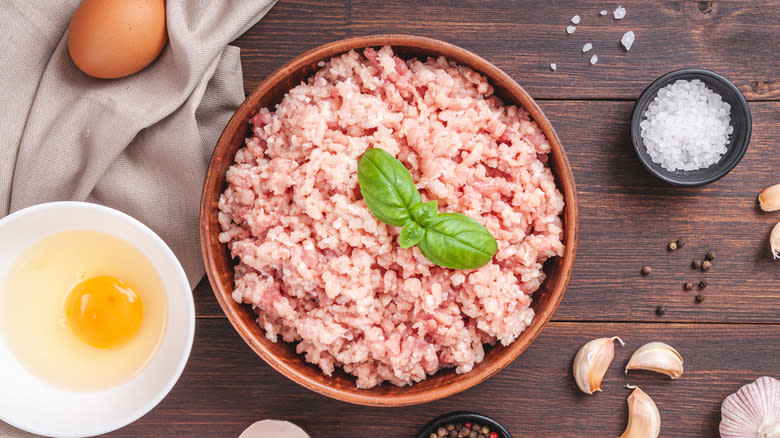
Ground turkey is one of those ingredients that seems straightforward -- until you try to cook with it. The meat product's popularity has increased massively in recent years, especially in dishes where it acts as a substitute for ground beef. However, although it can seem like a straight swap for its beefy brother in a host of recipes, ground turkey has its own flavor and nutritional composition, which can lead to a lot of chefs making some rookie errors when cooking with it.
One of the main reasons why ground turkey is so popular -- its low fat content -- is also one of its main sources of mistakes. Because it's so lean, it's highly prone to becoming tough and crumbly, particularly when not enough fat is added or it's handled incorrectly. Ground turkey can also present its own challenges around food safety, requiring you to adhere to specific cooking styles and temperature minimums. That's all before you consider how easy it is to end up with no flavor in your ground turkey and produce a meal that's flat and unappetizing. Luckily, we're here to help you avoid all of these errors.
Read more: 15 Tips For Making The Best Meatloaf
Choosing Ground Turkey With The Wrong Fat Content
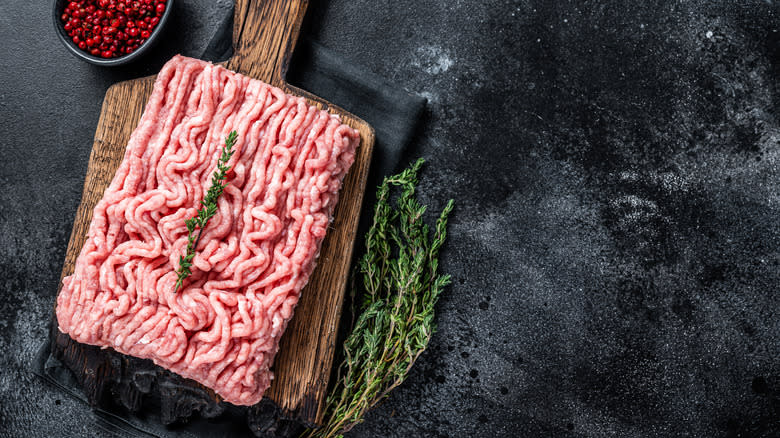
Ground turkey is renowned for its leanness, but not every pack has the same fat content. Some ground turkey blends can have as low as 1% fat, due to being made primarily with breast meat. The majority of the time, though, ground turkey has around 7% fat, with some varieties having up to 15% fat, thanks to having a higher proportion of dark meat mixed in.
This variation can present a real problem when it comes to cooking it, and failing to check your fat content can leave you with a tough, mealy result. If you mistakenly pick up a 1% fat variety and forget to put in additional oil or moisture, your turkey will remain way too lean, and while this may be beneficial if you're trying to cut down on fat, it will also negatively affect the meat's flavor and mouthfeel. Cooking with higher-fat turkey, meanwhile, can present the opposite problem. Adding too much additional fat to fatty ground turkey will make your dish too greasy and cause you to have to drain it more thoroughly -- or else endure a pretty heavy meal. Avoiding all this, however, is pretty simple: You just need to figure out which blend of turkey you need for your meal and check the packaging carefully in the store before buying.
Assuming It Will Taste The Same As Ground Beef
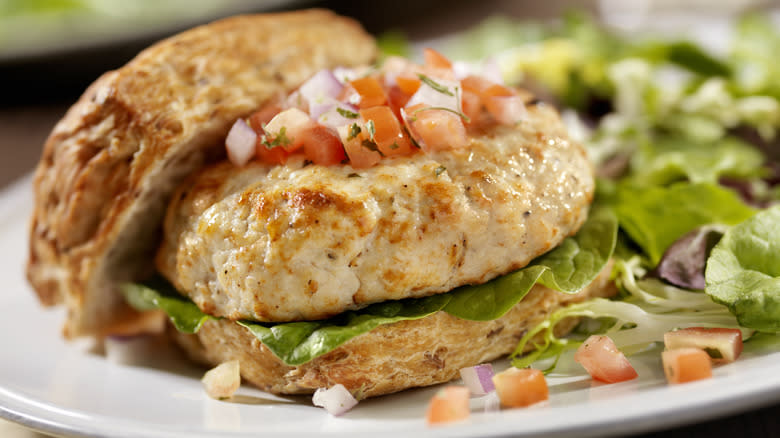
Ground turkey is a common substitute for ground beef -- but while their appearances might be similar, their tastes are worlds apart. Ground beef is red meat and has a strong, iron-rich taste that can give a meal heft but also dominate its flavor profile. Ground turkey, meanwhile, is poultry and generally has a mild, subtle taste. This flavor becomes milder when the ground turkey is lower in fat due to a lower concentration of dark meat, which supplies it with richness.
Swapping one for the other, therefore, will never give you exactly the same result, even if you're using the same ingredients and seasonings around them. The best thing to do is to try to honor the natural taste of the turkey itself and aim for a lighter overall flavor profile in your meal. If you're craving the taste of beef but only have ground turkey at hand, adding some umami-rich Worcestershire sauce can help it emulate the red meat. This is an especially good trick for turkey burgers, which you can cook on the grill for added smokiness. Adding beef bouillon can also help to give it a beef-like taste and is a great trick for stews and ragù sauces.
Cooking It Straight From The Fridge
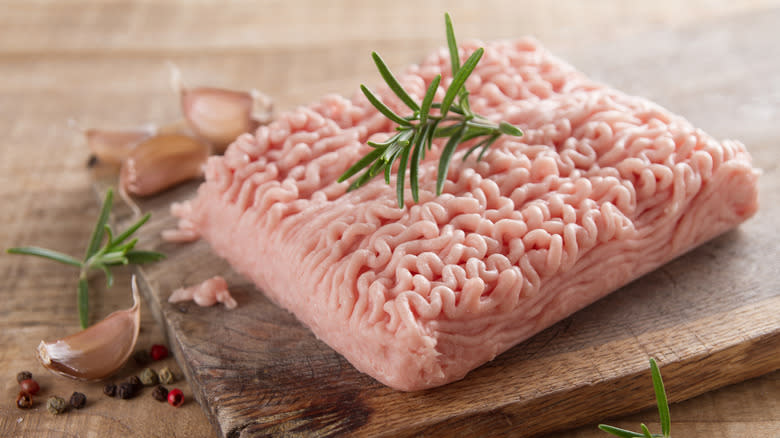
If you're in a hurry to make dinner, waiting for your ground turkey to come up to room temperature is pretty annoying. Failing to do so, though, and cooking it straight from the fridge, will give you an uneven result. When you add cold ground meat to a hot pan, you bring the overall temperature down. This can mean that your ground turkey takes longer to cook through, and while this isn't a huge issue because the individual pieces of meat are so small, it can result in you moving forward to the next step in your recipe before your turkey is fully cooked.
Lowering the pan's temperature can also create issues with browning your meat properly, stopping it from achieving a proper sear. This can both reduce flavor and cause your ground turkey to become overcooked as you crank up the heat to try and brown it. Luckily, you can avoid this entirely by pulling your meat out of the fridge shortly before cooking. You don't need to do this too far in advance, either: Around 15 minutes should do the trick.
Forgetting To Use A Binder
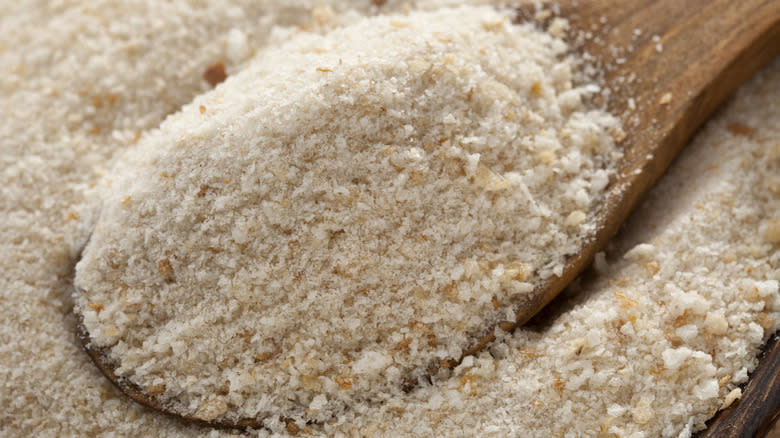
Ground turkey is used in a lot of recipes, but turkey burgers might be the most common. Unfortunately, though, turkey burgers can become crumbly and dry exceptionally quickly. This is because of their lower fat content, which can make them both more prone to falling apart and less moist. When you combine this with the hot heat of a sizzling grill, your turkey burgers can become loose very quickly.
The best way to avoid this is by using a binder. A sprinkling of dried breadcrumbs and a beaten egg can work wonders here, with the breadcrumbs soaking up the fat from the egg and holding your meat together. This will stop your meat from falling apart when it hits the grill and will also imbue it with extra moisture. To help your meat out even more, try adding in some extra fat. A couple tablespoons of chicken or turkey fat per pound of meat is ideal. Because the fat is solid and pliable at room temperature, it will help the burgers hold together and stop them from becoming too wet. Bear in mind, though, that this works best for lean ground turkey: Higher-fat blends may not require any extra fat.
Overmixing Your Turkey Meat
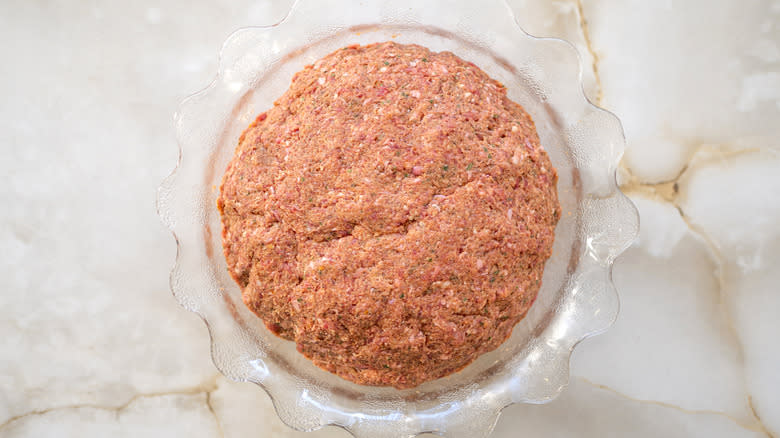
Whether you're making turkey burgers, turkey meatloaf, or turkey meatballs, at some point you'll have to get hands-on with your meat. You can overdo things, though, by overmixing your meat blend with its seasonings. When you mix ground turkey, this causes a protein in the meat, called myosin, to toughen up and make everything more chewy. This can be exacerbated by adding salt to the meat, which causes myosin to release even more. The more you mix it, the more your meat gains a chewy, dry consistency, taking away any tenderness whatsoever.
Remember, when it comes to mixing meat, less is more. You should only mix your meat blend until it's just combined with its seasonings, and then form it into your chosen shape. To avoid the temptation to mix your meat too much, make sure your seasonings are distributed evenly over your ground turkey before you start the mixing process. If you dump them all into one spot, you'll have to work the meat even more to ensure that it's distributed properly.
Underseasoning Your Meat
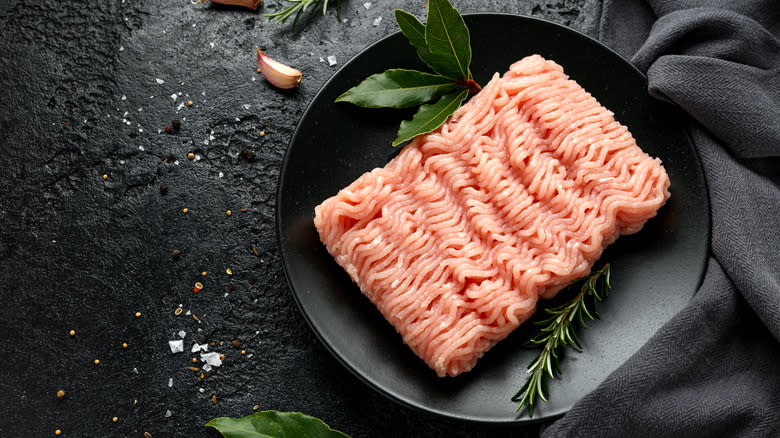
Of all the mistakes you can make with ground turkey, the ones that ruin its flavor hit the hardest. Underseasoning your meat is probably the quickest way to leave you with a dry, tasteless turkey-based meal. The issue with ground turkey is that its flavor is especially mild and, dare we say, somewhat bland. This isn't always a major problem, as it means that the meat doesn't dominate your dish and overpower any other flavor, but it does mean that unless you bolster it with significant amounts of seasoning, it may as well not be there.
What you need to try to avoid, though, is just using salt to boost its flavor. Doing this will make your ground turkey taste (you guessed it!) overly salty, and it won't give the meat any depth or extra dimensions. Instead, try to use a combination of spices, herbs, salt, and pepper, all of which deliver flavor in different ways, to make your ground turkey sing. Try to match your seasoning blend to the flavor world of your dish. If in doubt, though, a blend of Italian seasoning, paprika, and onion and garlic powder, along with salt and pepper, will normally make it taste pretty darn good.
Failing To Cook Your Ground Turkey To The Right Temperature
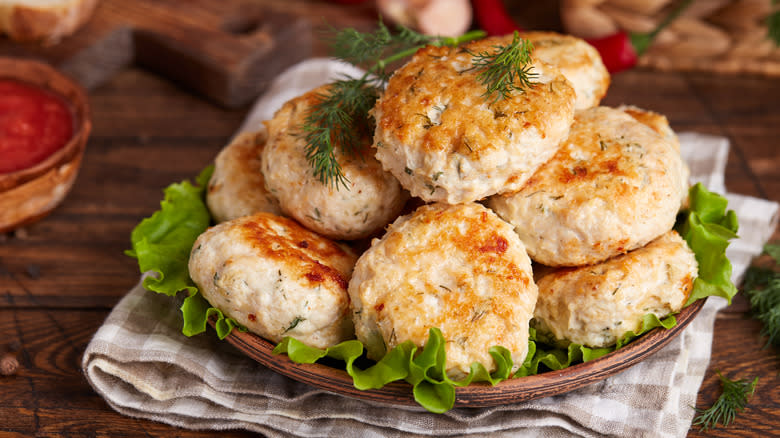
Ground turkey, like all ground meat, tends to cook way quicker than other cuts. However, that doesn't mean it's ready instantly -- and undercooking it can pose some serious health issues. Unlike some red meats, poultry needs to be cooked fully, leaving no pink spots, due to its potential to have bacteria running all the way through it. Turkey in particular is prone to contamination from several types of germs, including Salmonella and Campylobacter, which can cause food poisoning.
This means that while you might be able to get away with leaving a beef burger slightly rare on its inside, you definitely won't be able to do so with a turkey burger. As such, take extra care to cook it all the way through, ensuring that it reaches 165 degrees Fahrenheit at its thickest point. If you're not used to cooking with ground turkey, don't be tempted to guess here. Grab a meat thermometer and stick it into the center of your burger, from the side. Make sure it reaches the middle of the burger and leave it there for a moment or two, to get the most accurate read possible.
Forgetting To Use Your Potato Masher
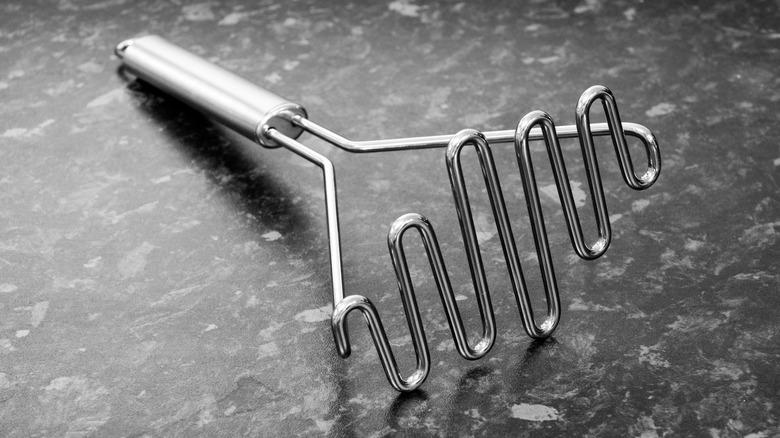
Are you sick of toiling over a dish containing ground turkey, only to end up with big, chewy chunks of it in your meal? If so, you're likely not doing enough to break up the pieces. Ground turkey, like all ground meat, has an annoying propensity for staying stuck together, and while you can break it up using your spoon, its thin edges and relative lack of surface area can make this pretty annoying.
That's why you should break out the potato masher the next time you're cooking ground turkey. These wide, flat utensils are perfect for applying pressure to ground meat, forcing it apart in the pan and preventing it from remaining clumped up. It's always best to use your potato masher to break up your meat before you've added too many other ingredients, to avoid breaking them down. We would recommend using it relatively early on in your cooking process, while your turkey is still browning. Just press it on top of your meat chunks lightly (making sure not to pulverize them, as this can make your ground turkey mushy), and they should separate easily.
Not Stirring It Often Enough
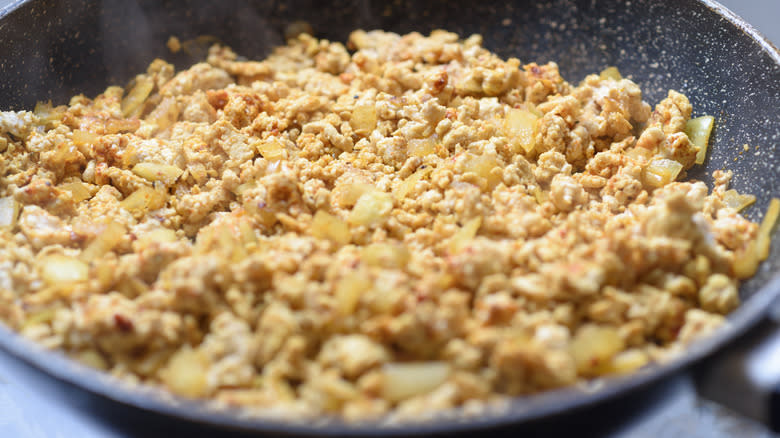
Ground turkey has a real knack for sticking to your pan. While this can happen with all types of ground meat, it's especially likely with ground turkey due to its generally low fat content. Because a relatively small amount of fat is being released as the turkey heats up, it doesn't lubricate the pan as it cooks, and as a result, it will adhere to the metal and scorch if it isn't stirred.
While adding more fat to keep it moist and well-oiled is a good move, stirring it often enough is also necessary. By keeping the meat moving, you stop it from dwelling too long in one spot and becoming glued to the surface. You may also want to consider using certain types of pans to cook ultra-lean ground turkey. Nonstick and Teflon-coated pans can be a great option, as they prevent even foods with the smallest amounts of fat from sticking. Other materials, like stainless steel, may be less useful for ground turkey, due to the metal's porosity, which can cause food to stick to it more easily.
Overcooking Ground Turkey
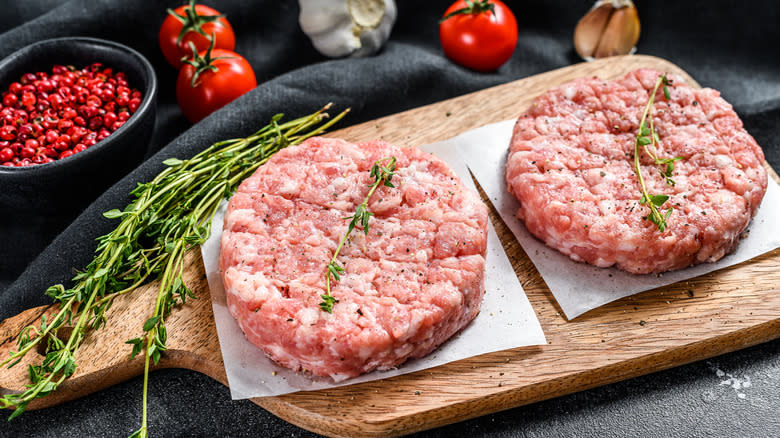
Ground turkey is pretty delicate, y'all. Not only does it have a particularly mild flavor, but it can also overcook very quickly. As with many problems when it comes to ground turkey, this is because of its lower fat content. Because there's less fat to lubricate it and stop it from drying out, it can turn from just cooked to dry and gritty very quickly.
The solution is to be very careful when cooking ground turkey and avoid blasting it with heat for too long. Ground turkey takes around four to five minutes on the stove, and slightly longer on a lower heat, to cook through fully. In the oven, it can take longer (around 15 to 20 minutes), and turkey burgers and turkey meatballs can vary considerably depending on their size. The main thing to look out for is whether the turkey has any pinkness: Once it's pale white throughout (and at least 165 degrees Fahrenheit), it's done, and you should take it off the heat or go to the next stage of your recipe. If you want to develop brownness on your turkey meat, the key is not to cook it for longer but to hit it with a higher heat straight off the bat.
Not Draining Your Meat
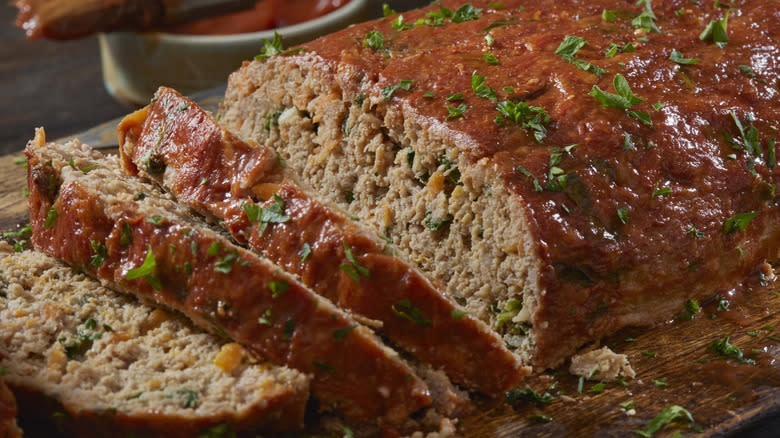
You might think that ground turkey doesn't require the same draining treatment as ground beef, and a lot of the time, you might be right. Ground beef is notorious for releasing too much grease while cooking, and if you're using a lean ground turkey, there may not be enough fat to release grease in the first place. If you've added too much fat, however, or you're using a higher-fat ground turkey blend, it can become oil-logged very quickly. Unless you drain it, all of that fat will end up in your food.
As such, if your ground turkey looks greasy or wet after you've cooked it, you should drain it. Start by pushing your meat to one side of your pan, angling it slightly so that the grease drips into the empty side. You can then extract the grease by spooning it out or using a turkey baster to suck it up. You can also use a piece of paper towel to blot out the excess oil, but be very careful when you do this that you don't get hot grease on your hands or touch the pan's surface.
Cooking With Expired Ground Turkey

If you don't cook with ground turkey very often, it can be hard to tell when it's gone bad. Unfortunately, though, you may have less time than you think to use it up. Ground turkey starts to go bad between 24 to 48 hours after purchase, even when it's being stored in the fridge. If left at room temperature, you may only have two hours before it starts to develop bacteria.
Cooking and eating expired ground turkey can pose some serious risks and cause food poisoning. Therefore, you should always assess whether it's spoiled before you start cooking with it. Don't trust the sell-by or use-by date printed on the package implicitly, as you don't always know the conditions that specific package has been kept under. A sour smell can be the first giveaway: Fresh turkey meat shouldn't smell of anything, and if it has an unpleasant scent, it's probably started to go bad. Spoiled ground turkey can also have a tacky and slimy surface, and it may also develop a grayish or brownish color.
Pushing Down On Your Ground Turkey Burgers While Grilling
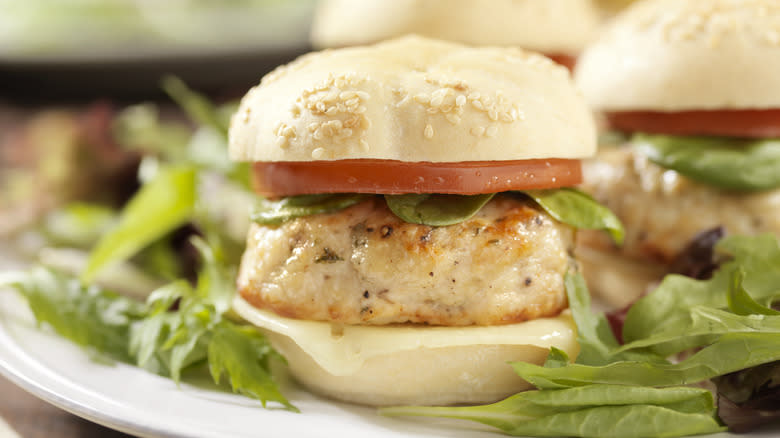
Making burgers is a hands-on experience that invites you to poke, prod, and press them when they're on the grill. Unfortunately, the mistake you might be making when it comes to turkey burgers is pushing down on them unnecessarily while they're cooking. Turkey burgers can easily end up dry and flavorless, and they need all the moisture they can get. When you press them with your spatula while they're grilling, you push their moisture out, and it ends up dripping onto your grill.
To sidestep this, the trick is to leave your burgers alone. Once they're on the grill, try to touch them as little as possible, moving them only to turn them over. By avoiding poking and pushing them, you'll also help them develop a proper sear and those all-important grill marks, as well as allow them to maintain a proper connection with the metal, delivering them consistent heat. As turkey burgers have a real habit of drying up, ensure that your grill is always well-greased before adding your patties: Otherwise, they may well break apart when you flip them, due to them getting stuck on the metal.
Forgetting To Add Moistening Ingredients
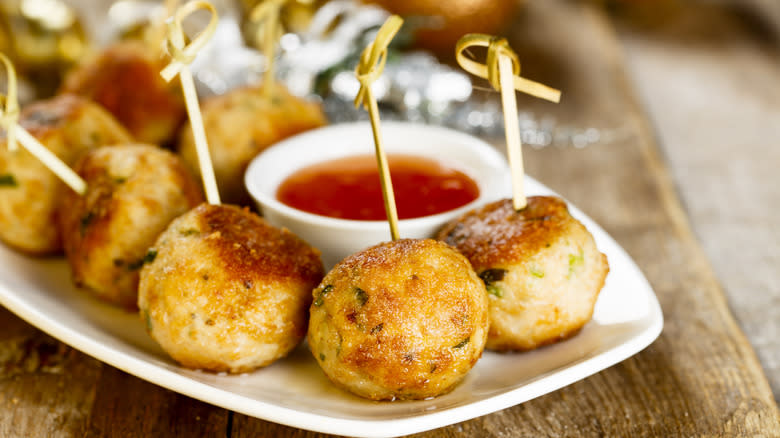
Figuring out how to add moisture to ground turkey is something people have been working on for generations. Luckily, a few good tricks have been discovered along the way, and while you can ignore these and do your own thing, we'd heavily recommend trying them out. One of the best ways to prevent ground turkey from drying out is by incorporating some minced mushrooms. Thanks to their combination of high water content and pleasant, meaty taste, finely chopped mushrooms add both moisture and flavor, incorporate well with the turkey meat, and bulk out your meal.
If you're making turkey meatballs or burgers, a tablespoon or two of grated butter can also give your meat some extra moisture. Butter will also give your ground turkey a silkier mouthfeel and bolster its taste. To add moisture without incorporating extra fat, try throwing in some grated zucchini. This is a great way to add a touch of greenery to your burgers, as well as vitamins A and C, while keeping them juicy. Just make sure to squeeze the zucchini well before adding it, to drain off excess water.
Read the original article on Daily Meal

